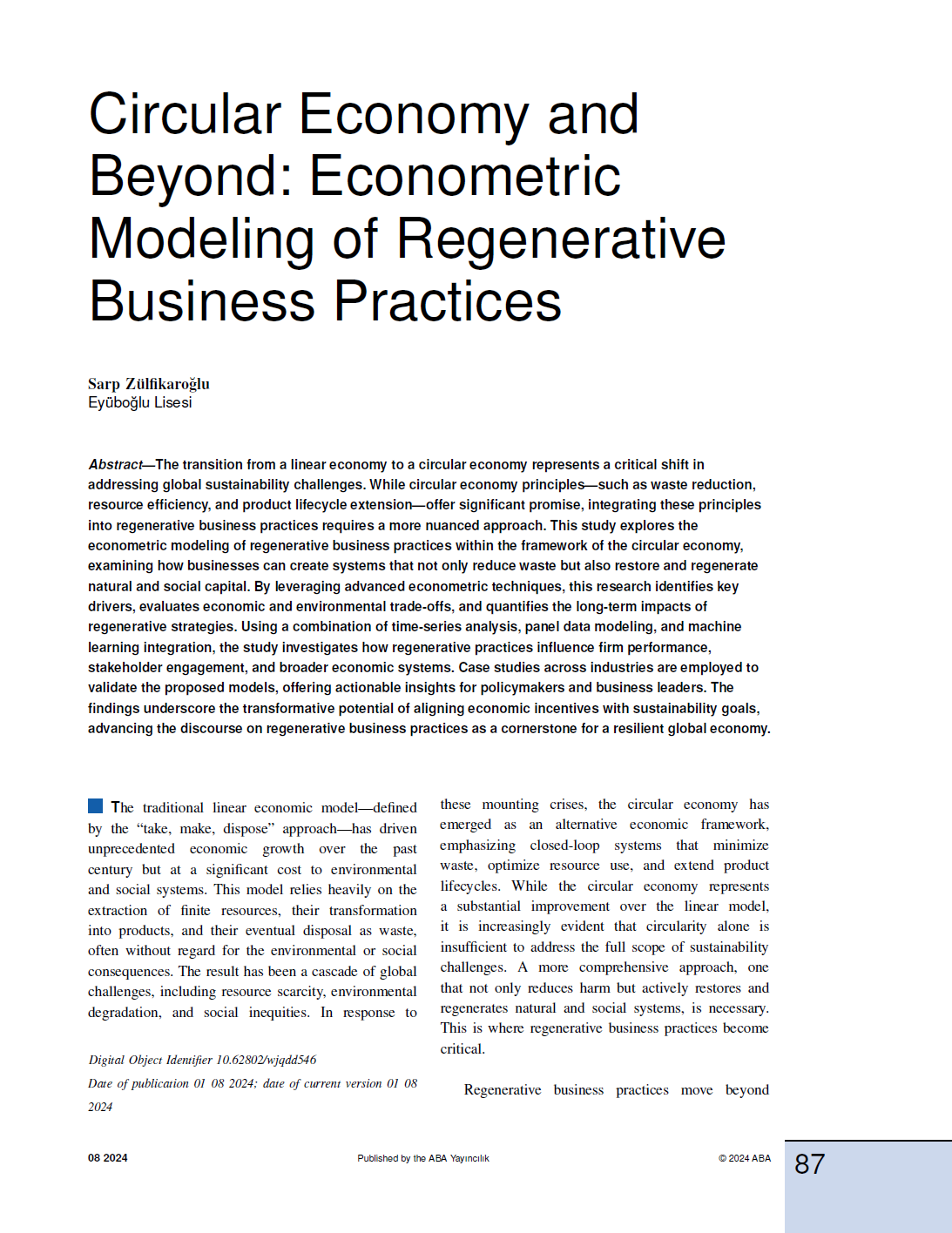Circular Economy and Beyond: Econometric Modeling of Regenerative Business Practices
DOI:
https://doi.org/10.62802/0rnzfs83Keywords:
Circular economy, regenerative business practices, econometric modeling, sustainability, closed-loop supply chains, resource efficiency, waste reduction, carbon footprint, economic growth, environmental impact, innovation, resilienceAbstract
The transition from a linear economy to a circular economy represents a critical shift in addressing global sustainability challenges. While circular economy principles—such as waste reduction, resource efficiency, and product lifecycle extension—offer significant promise, integrating these principles into regenerative business practices requires a more nuanced approach. This study explores the econometric modeling of regenerative business practices within the framework of the circular economy, examining how businesses can create systems that not only reduce waste but also restore and regenerate natural and social capital. By leveraging advanced econometric techniques, this research identifies key drivers, evaluates economic and environmental trade-offs, and quantifies the long-term impacts of regenerative strategies. Using a combination of time-series analysis, panel data modeling, and machine learning integration, the study investigates how regenerative practices influence firm performance, stakeholder engagement, and broader economic systems. Case studies across industries are employed to validate the proposed models, offering actionable insights for policymakers and business leaders. The findings underscore the transformative potential of aligning economic incentives with sustainability goals, advancing the discourse on regenerative business practices as a cornerstone for a resilient global economy.
References
Das, A., & Bocken, N. (2024). Regenerative business strategies: A database and typology to inspire business experimentation towards sustainability. Sustainable Production and Consumption, 49, 529-544.
De Martino, M., Apicerni, V., & Gravagnuolo, A. (2024). Sustainable hospitality and tourism in the Anthropocene era: the need for a more radical shift of the current circular economy models. International Journal of Contemporary Hospitality Management.
De Wolf, C., & Bocken, N. (2024). Digital Transformation of the Built Environment Towards a Regenerative Future. In A Circular Built Environment in the Digital Age (pp. 259-275). Cham: Springer International Publishing.
Drupsteen, L., & Wakkee, I. (2024). Exploring Characteristics of Regenerative Business Models through a Delphi-Inspired Approach. Sustainability, 16(7), 3062.
Hossain, M., Park, S., Suchek, N., & Pansera, M. (2024). Circular economy: A review of review articles. Business Strategy and the Environment.
Montes-Pineda, Ó., & Garrido-Yserte, R. (2024). Artificial intelligence and circular economy: what is new for business model innovation?. In Artificial Intelligence and Business Transformation: Impact in HR Management, Innovation and Technology Challenges (pp. 41-59). Cham: Springer Nature Switzerland.
Mubarik, M. S., Kontoleon, A., & Shahbaz, M. (2024). Beyond the hurdles: Exploring policy obstacles in the path to circular economy adoption. Journal of Environmental Management, 370, 122667.
Ometto, A. R., Sarkis, J., & Evans, S. (2024). Introduction: Circular Economy as a Part of the New and Sustainable Economy in the Twenty-first Century. In A Systemic Transition to Circular Economy: Business and Technology Perspectives (pp. 1-14). Cham: Springer International Publishing.
Ramírez-Escamilla, H. G., Martínez-Rodríguez, M. C., Padilla-Rivera, A., Domínguez-Solís, D., & Campos-Villegas, L. E. (2024). Advancing Toward Sustainability: A Systematic Review of Circular Economy Strategies in the Textile Industry. Recycling, 9(5), 95.
Rosário, A. T., Lopes, P., & Rosário, F. S. (2024). Sustainability and the circular economy business development. Sustainability, 16(14), 6092.
Tuboalabo, A., Buinwi, U., Okatta, C. G., Johnson, E., & Buinwi, J. A. (2024). Circular economy integration in traditional business models: Strategies and outcomes. Finance & Accounting Research Journal, 6(6), 1105-1123.
Wakkee, I., & Drupsteen, L. (2024). Exploring Regenerative Business Models: How frontrunners in entrepreneurship and business model innovation may contribute to economic transformation.
Zahran, S. (2024). Investigating the Nexus between Green Supply Chain Practices and Sustainable Waste Management in Advancing Circular Economy. Sustainability, 16(9), 3566.
Zorpas, A. A. (2024). The hidden concept and the beauty of multiple “R” in the framework of waste strategies development reflecting to circular economy principles. Science of The Total Environment, 952, 175508.









